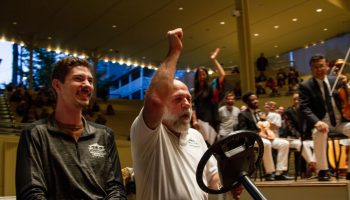Now that the Republican and Democratic national conventions have concluded, Chautauquans will have the opportunity to hear from a former delegate to the 1967-1968 Pennsylvania Constitutional Convention and the 1972 Republican National Convention, who went on to represent his hometown of Warren, Pennsylvania, in the U.S. House of Representatives from 1979 to 1997.
At 9:15 a.m. Thursday at the Chautauqua Women’s Club House, William Clinger Jr. — former chair of the Chautauqua Institution Board of Trustees — will give the sixth “Chautauqua Speaks” presentation of the season. It is titled “‘Political Polarity’ — Why the Two Parties Are Further Apart Politically, Demographically, Racially and Socially than Ever Before.”
According to Clinger, “Democratic and Republican polarity has gotten worse” since last summer, when he accepted the Women’s Club’s invitation to speak about political polarity at the national level in the United States.
A University of Virginia-trained lawyer, Clinger served as chief counsel of the U.S. Commerce Department’s Economic Development Administration during the Ford Administration. Two years later, he began his 18-year tenure in Congress. He said that “over that time, it transformed dramatically.”
“This is more of a chicken-and-egg lecture with respect to polarization,” Clinger said. “Did the people come first or the Congress? How did the division — the collapse in the middle — occur? I would have been considered a moderate. Now there aren’t any moderates; a pox on both your houses.”
When he began, members of Congress moved their families to the Washington, D.C. areas and socialized.
“By the time I left, members were not bringing their families because that was a way for your opponents to attack you; you got hit,” Clinger said. “That was a major change.”
Many members of Congress slept in their offices rather than share an apartment with colleagues.
Clinger’s talk will explore how Republicans and Democrats became so vehemently opposed. He said two of the reasons are the reapportionment of congressional districts and the polarization of media communications.
In 1995, the Republicans gained control of the House of Representatives. Six weeks before the first mid-term election of President Bill Clinton’s administration in November 1994, all non-incumbent Republican congressional candidates and all but two Republican congressmen had signed the Contract with America.
In writing that document, Newt Gingrich and Dick Armey borrowed some of the text from former President Ronald Reagan’s 1985 State of the Union Address. Many of their policy ideas came from the conservative think tank, The Heritage Foundation.
Clinger said that half of the issues in the Contract came under the jurisdiction of the House Committee on Oversight and Government Reform. Having been the committee’s ranking minority member when the Democrats were the majority party, he now chaired it.
Those who signed the Contract pledged to bring up for a vote — on the first day that the Republican Party became the majority party in the House — eight substantial government and operational reform measures.
The Contract signatories also promised during the first 100 days of the 104th Congress, they would bring 10 bills to the House floor, debate them fully and openly, and vote on them. Each bill was included in the Contract. A balanced-budget requirement, tax cuts, legislative term limits, reforms to tort law, Social Security and welfare were included.
“When we first got control in 1994, I had the duty to discharge those Contract issues within 100 days,” Clinger said. “There were several Tea Party-leaning people — seven or eight — on my committee. I sat down with each to discuss unfunded mandates and other issues, and said, ‘I need your help to get these out of committee.’ All of them said, ‘We’re not here to compromise.’ That was sort of the canary in the coal mine. Legislation is the art of compromise, but they couldn’t see it that way. I could not get four of my members to vote the bill out of committee.”
According to Clinger, current Speaker of the House Paul Ryan has a much worse job than he had.
“The ‘Freedom Caucus’ is very, very conservative. It came out of the districts with 90 percent Republican voters,” Clinger said. “Their only opposition is their opponent in the primary election, who’s even more to the right, so they take a rigid right-wing stand.”
Clinger said he has written to Ryan to ask him to drop the “Hastert Rule,” also known as the “majority of the majority” rule, an informal principle that has governed Republican Speakers of the House since 1995.
“The Speaker will not bring a bill to the House floor until he is sure he has a majority of the Republican majority in Congress voting for it,” Clinger said. “They have him hostage. Paul Ryan needs to try to preserve a monitoring situation.”
In 1996, Clinger decided not to run for re-election to Congress. Since 2006, he has co-chaired the bipartisan, 12-member board of the Institute for Representative Government, which is funded largely by the State Department. IRG’s mission is “promoting democratic governance, person to person.”
Clinger said the IRG is the umbrella group — the facilitator — for programs run by the National Democratic Institute and the International Republican Institute. Each year, four to five groups — usually comprised of emerging young leaders, primarily from the government (political and administrative) and business sectors — come to the United States. The IRG makes the decisions about who will be coming and where they will go.
The visitors spend a week in Washington, D.C., hearing from IRG’s board members, including Clinger, meeting with sitting officials, and learning about how Congress — with its representative rather than parliamentary form of government — works. So that they gain a better understanding of how the U.S. federal system works at the state level, board members also schedule meetings for group members in their home state.
“The irony is that our role is to teach them how democracy works,” Clinger said. “They ask challenging questions. In the last one, they asked who [Donald] Trump is, and said that people seem to be mad at each other.”
Clinger has also been active at Johns Hopkins University, where he earned his bachelor’s degree. He is a senior fellow in governmental studies at JHU’s Center for Advanced Governmental Studies in Washington, D.C. He said his main function is as an adviser to graduate students writing theses about congressional issues. He also sits on oral thesis defense teams and lectures occasionally. Each year, one student is honored at graduation with an award in his name.
Watching both national conventions this July was “very disheartening” for Clinger.
“The Democrats stumbled out of the blocks, but did a very good job of humanizing Hillary [Clinton],” he said. “People don’t trust her, and they did a good job. Some of the Democratic speakers were powerful. … No one can understand why Trump isn’t in freefall. I was absolutely astonished that Trump got a 3 to 4 percent bump after the Republication National Convention. I thought it was a disaster. It’s amazing the election is this close.”
Clinger said that in western Pennsylvania, where he hails from, “people are out of work, there’s a sense of hopelessness and they’re worried about immigration. Trump has made serious inroads. Pennsylvania will be much more in play in this election, as will Ohio and Michigan. My prediction is that this will not be a nicer campaign. Sadly, it will be ugly, ugly, ugly.”






